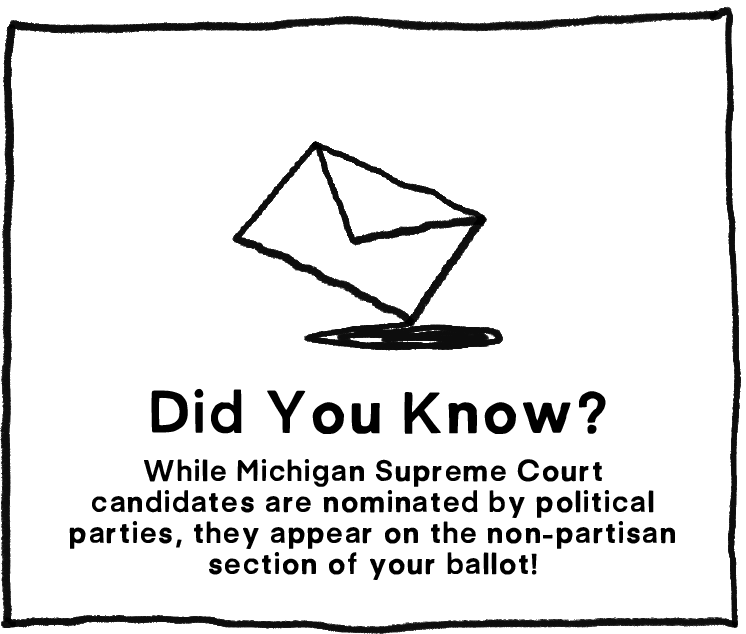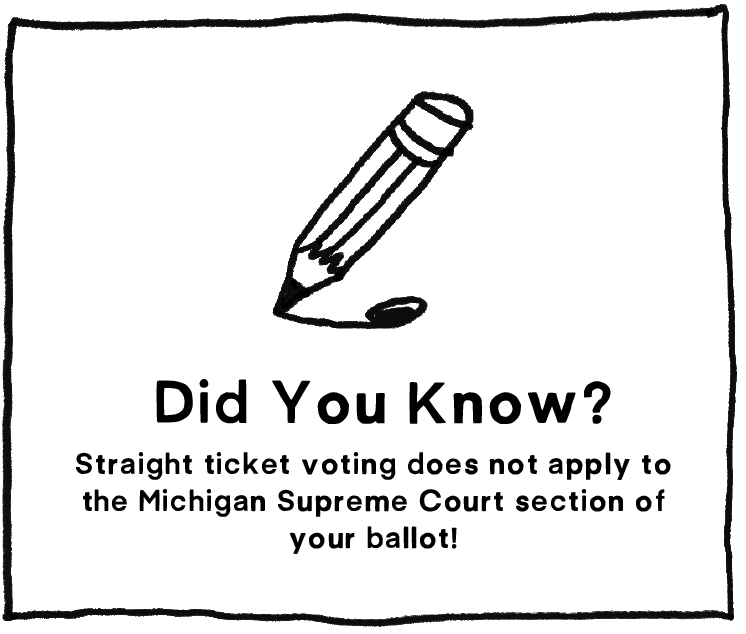The MI Supreme Court is the guardian of justice, fairness, and our freedoms in the state.
The justices who sit on the bench and make decisions touch every aspect of our lives, from civil rights and criminal justice to environmental protection and economic regulations. Yet, many Michiganders are unaware that they have the power to choose the individuals who serve on this vital institution. Unlike the U.S. Supreme Court, Michigan Supreme Court Justices are elected by the people, making your vote critical to the future of Michigan.
This November, you have the opportunity to shape the highest court in Michigan,
but this requires going beyond straight-ticket voting by going further down your ballot to the nonpartisan section and voting for two candidates who you want to sit on the Michigan Supreme Court.
When filling out your ballot, don’t stop at the top! Journey all the way down to the Michigan Supreme Court elections on the non-partisan section of your ballot! It’s like finding the hidden treasure at the bottom, where your vote helps choose the guardians of justice who shape our state’s future.

What is the Role of the MI Supreme Court?
The people we elect to the MI Supreme Court will be making important decisions for all Michiganders
on issues about reproductive rights, abortion laws, gun safety, and fair elections. So, whoever wins this election is going to have a big say in what the future of Michigan looks like.
The Michigan Supreme Court is the ultimate decider on legal issues in Michigan,
sifting through over 2,000 appeals each year. The Court picks only the most complex and important ones, where extra discussions and arguments help ensure a just and fair ending. The highest court of our state serves as the guardian of justice, tackling the toughest challenges to keep our state in harmony.
The Michigan Supreme Court is made up of seven justices elected for eight-year terms.
To be a candidate, one must be a qualified elector, a licensed Michigan lawyer for five years, and under 70 at the time of their election. If a seat opens up, the Governor steps in and appoints someone to fill the seat until the next election. This is how Justice Kyra Harris Bolden entered the court.
Where Do I Find the MI Supreme Court on My Ballot?
Don’t just check the straight-ticket box and call it a day.
Take a moment to dive a little deeper, because there is more work to be done at the bottom of the ballot in the nonpartisan section.
That’s where you’ll find the Michigan Supreme Court elections, where your vote helps choose justices who will shape our future!

How Are Candidates Selected?
Supreme Court Justices in Michigan must be nominated by a political party, but on your ballot their party affiliation is not included.
Elected by a vote of their peers on the court every two years, the Chief Justice leads the Michigan Supreme Court, guiding the court in upholding the principles of justice, fairness, and constitutional integrity.
Kyra Harris Bolden is the only incumbent justice seeking reelection this year. She was the first Black woman to serve on the Michigan Supreme Court.
She sided with the majority opinion of the court that allowed Michiganders to decide on abortion rights through Proposal 3 and she ruled to extend anti-discrimination protections to LGBTQ folks.
MISC vs. SCOTUS
Unlike the United States Supreme Court, where justices serve for life, justices on the Michigan Supreme Court must be under the age 70 at the time of their election.
Although there are no limits on the number of terms a Supreme Court Justice can serve besides age, they must be reelected every eight years to the high court.
Unlike the U.S. Supreme Court justices, who are nominated and confirmed by the President and U.S. Senate, respectively,
Michigan Supreme Court justices are elected by the popular vote of Michiganders.
This difference highlights how Michigan’s system allows the people to have a direct say in who serves on the state’s highest court.
As Michiganders, it’s important to recognize the distinct roles of the U.S. Supreme Court and the Michigan Supreme Court. Both courts serve as the final authority in interpreting laws and judicial rules.

Helpful Links and Resources
- Michigan Supreme Court – Official Website
- How State Supreme Court Justices Are Selected – Democracy Docket
- MI Supreme Court to weigh in on ‘adopt-and-amend’ which could impact minimum wage – Fox47
- MI judges required to use preferred pronouns in court under new rule – BridgeMI
- Michigan Supreme Court puts abortion on the November ballot – Politico
- Michigan Supreme Court allows ‘indirect retaliation’ workplace lawsuit – WDet.org
- Poop pollution case reaches Michigan Supreme Court – The Gander
- Significant Michigan Civil Rights Case Decisions – Michigan.gov



